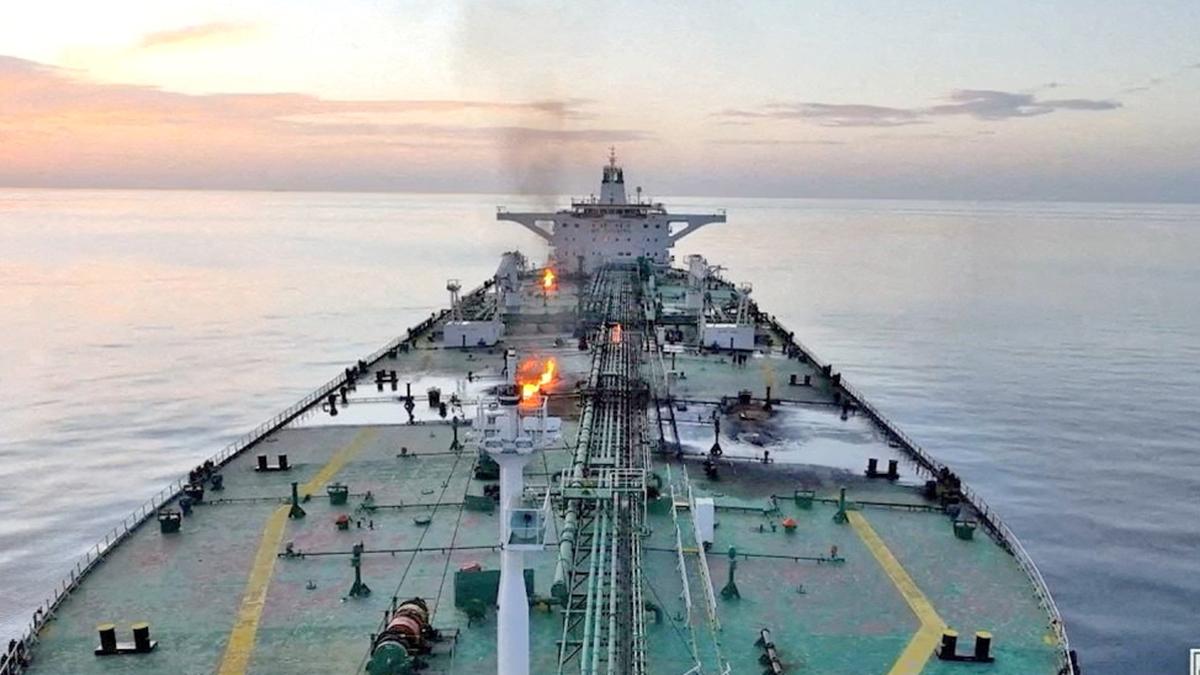On a warm spring night in Athens, shortly before midnight, a senior executive at a Greek shipping company noticed an unusual email had landed in his personal inbox. The message, which was also sent to the manager’s business email address, warned that one of the company’s vessels travelling through the Red Sea was at risk of being attacked by Yemen’s Iran-backed Houthi militia.
The Greek-managed ship had violated a Houthi-imposed transit ban by docking at an Israeli port and would be “directly targeted by the Yemeni Armed Forces in any area they deem appropriate,” read the message.
“You bear the responsibility and consequences of including the vessel in the ban list,” said the email, signed by the Yemen-based Humanitarian Operations Coordination Center (HOCC), a body set up in February to liaise between Houthi forces and commercial shipping operators. The Houthis have carried out nearly 100 attacks on ships crossing the Red Sea since November, acting in solidarity with Palestinians in Israel’s year-long war in Gaza. They have sunk two vessels, seized another and killed at least four seafarers.
The email, received at the end of May, warned of “sanctions” for the entire company’s fleet if the vessel continued “to violate the ban criteria and enter the ports of the usurping Israeli entity”.
The executive and the company declined to be named for safety reasons.
The warning message was the first of more than a dozen increasingly menacing emails sent to at least six Greek shipping companies since May amid rising geopolitical tension in West Asia, according to six industry sources with direct knowledge of the emails and two with indirect knowledge.
The email campaign, which has not been previously reported, indicates that Houthi rebels are casting their net wider and targeting Greek merchant ships with little or no connection to Israel.
The threats were also, for the first time in recent months, directed at entire fleets, increasing the risks for those vessels still trying to cross the Red Sea.
“Your ships breached the decision of Yemen Armed Forces,” read a separate email sent in June from a Yemeni government web domain to the first company weeks later and to another Greek shipping company, which also declined to be named. “Therefore, punishments will be imposed on all vessels of your company … Best Regards, Yemen Navy.”
Yemen, which lies at the entrance to the Red Sea, has been embroiled in years of civil war. In 2014, the Houthis took control of the capital, Sana’a, and ousted the internationally recognised government. In January, the United States put the Houthis back on its list of terrorist groups.
Houthi officials declined to confirm they had sent the emails or provide any additional comment, saying that was classified military information.
Reuters could not determine whether the emails had been also sent to other foreign shipping companies.
Greek-owned ships, which represent one of the largest fleets in the world, comprise nearly 30% of the attacks carried out by Houthi forces to early September, according to Lloyd’s List Intelligence data that did not specify whether those ships had any ties with Israel. In August, the Houthi militia — which is part of Iran’s Axis of Resistance — attacked the Sounion tanker leaving it on fire for weeks before it could be towed to a safer area. The strikes have prompted many cargoes to take a much longer route around Africa. Traffic through the Suez Canal has fallen from around 2,000 transits per month before November 2023 to around 800 in August, Lloyd’s List Intelligence data showed.
The European Union’s naval force Aspides, which has helped more than 200 ships to sail safely through the Red Sea, confirmed the evolution of Houthis’ tactics in a closed door meeting with shipping companies in early September.
‘Fourth phase’
In a document, shared with shipping companies, Aspides said the Houthis’ decision to extend warnings to entire fleets marked the beginning of the “fourth phase” of their military campaign in the Red Sea.
Aspides also urged ship owners to switch off their Automatic Identification System (AIS) transponders, which shows a vessel’s position and acts as a navigational aid to nearby ships, saying they had to “shut it off or be shot”.
Aspides said the Houthis’ missile strikes had 75% accuracy when aimed at vessels operating with the AIS tracking system on. But 96% of attacks missed when AIS was off, according to the same briefing.
“Aspides are aware of those emails,” its operational commander, Rear Admiral Vasileios Gryparis, said, adding that any response should be carefully considered and that companies are strongly advised to alert their security experts if contacted before sailing.
The email campaign has increased alarm among shipping companies. Insurance costs for Western ship owners’ have already jumped because of the Houthi’s attacks, with some insurers suspending cover altogether, the sources said.
The Houthis have not stopped all traffic and the majority of Chinese and Russian-owned ships — which they do not see as affiliated with Israel — are able to sail through unhindered with lower insurance costs.
“We are re-assuring the ships belonging to companies that have no connection with the Israeli enemy that they are safe and have freedom (of movement) and (to) keep the AIS devices going on all the time,” according to an audio recording of a Houthi message broadcast to ships in the Red Sea in September shared with Reuters.
“Thank you for your cooperation. Out.”
Published – October 04, 2024 09:33 am IST





